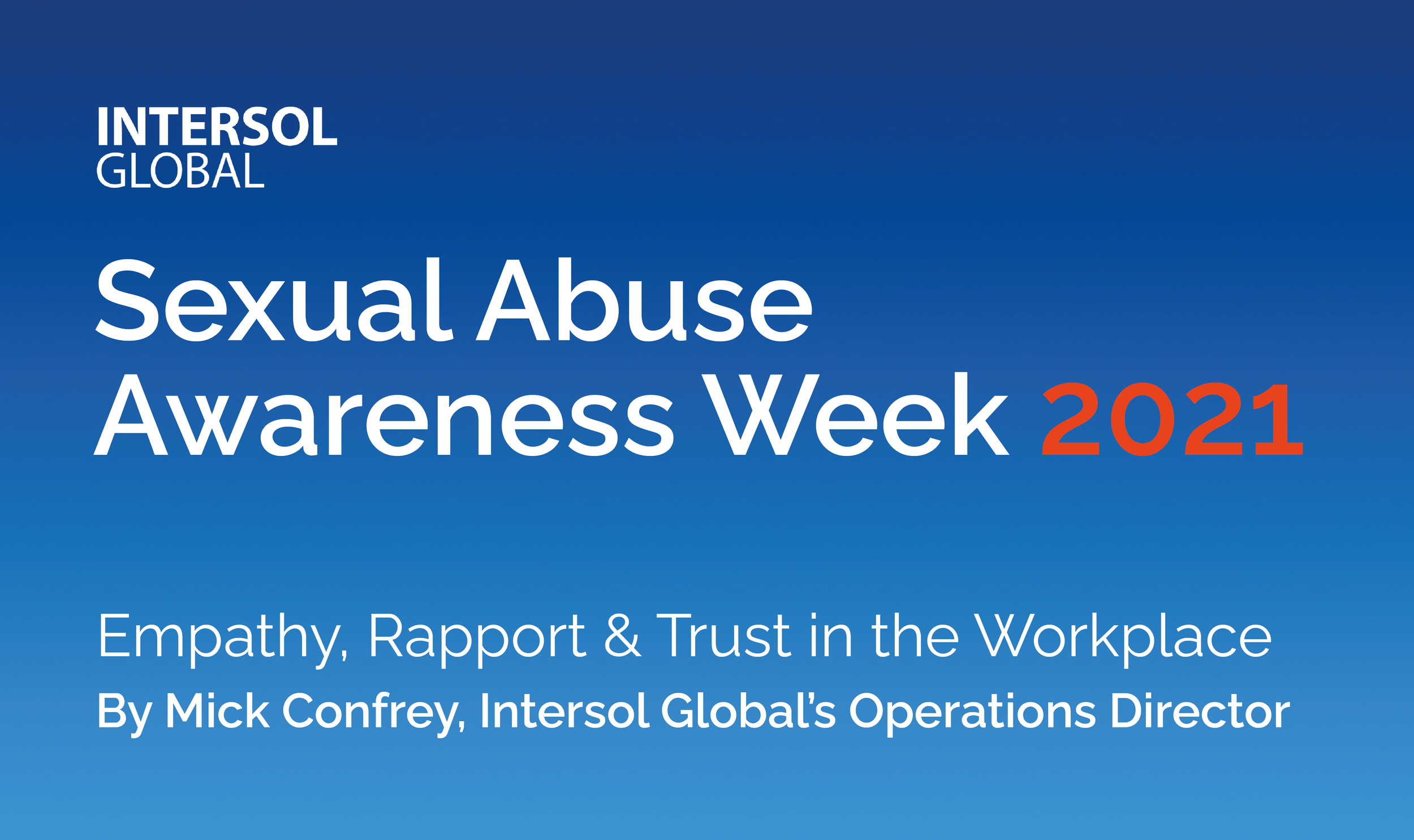A guide to empathy, rapport & trust in the workplace
As we enter Sexual abuse and sexual violence awareness week 2021 it presents an opportunity to better understand how empathy, rapport, and trust during workplace investigation meetings will do so much to support and deliver reliable outcomes for victims. Mick Confrey, Intersol chief operations officer, shares the experience of conducting hundreds of workplace cognitive interviews.
A key skill of an investigator conducting investigation meetings/interviews with persons reporting traumatic events is their ability to support and empower the person to give their account of events at their pace and in the order, they choose to relay the reported events. At the same time, the investigator must ensure that they get the detail that is needed to conduct the investigation in a way that unbiased and fair and to all parties.
Easy to say but difficult to do. To be able to do it the investigator must be a trained investigator, qualified in investigative interviewing, trauma led the investigation, and experienced in all three. The investigator must also have an understanding of empirically researched methods of investigative interviewing, know which method to use and when, and have the skill to allow flexibility between methods during the interview. Following a rigid model, whilst easier to teach and nice for any assessor to follow, may not be productive in practice. Humans are all different.
The difficulty to overcome is to recognise that there are different needs to be satisfied
The person reporting needs to trust the investigator to not only allow them to give their account but to understand that the process is fair and more importantly understand why the investigator may need to ask probing, sometimes uncomfortable questions of them to get the detail required to conduct the investigation and prevent them being undermined later in the investigation process.
The person reporting wants to be believed. The investigator must be confident in the process to be able to explain it. Any lack of understanding displayed by the investigator will diminish the reporting party's trust in them, and impact their willingness to share their account.
Empathy, rapport, and trust are easy words to say but require skill and understanding to display throughout the interview. The expectations of the person reporting must be carefully handled, and processes explained. This is particularly relevant in cases of reported events that may be considered criminal when the reporting party has declined police involvement, in which case the investigator must discuss the limitations of an internal investigation in comparison to a criminal investigation.
It is also worthy of note that it is the reporting person decision alone what investigative route they want to take, civil or criminal, although they will always retain the option to revert to the criminal investigation should they choose.
Witnesses, particularly witnesses to events in the workplace or between their peers often find themselves in a conflicting situation. Having grown up in a society where ‘telling tales’ or ‘grassing’ is frowned upon, they are now asked to do just that about people they may have to work with or associate with long after the investigator has left. Honesty is the key. The investigator must explain to witnesses exactly what will happen to their account and how it may be used in proceedings BEFORE the interview commences. People must be given the correct information and allowed to make informed choices, not be placed in difficult positions after the event. Again empathy, rapport, and trust are easy words to say but require skill and understanding to display throughout the interview.
Likely due to the constant police dramas on TV, when we think of interviews, we think of interviews of those suspected of doing something wrong (suspects). However difficult conducting those types of interviews may be, any experienced investigator will tell you that the real difficulty is persuading a witness to get involved in a process they don’t necessarily need or want to get involved in!
The responding party also needs to trust the investigator to investigate in an unbiased fair and professional way. Having likely conducted a workplace investigation meeting/interview with the person reporting before conducting a workplace investigation meeting/interview with the responding party, the investigator must understand, recognise, and avoid their own unconscious bias. This again is an easy thing to say but once again is very difficult to demonstrate and requires knowledge, understanding, and skilled experience by the investigator of their own psychology.
When considering how to approach a relevant person and what is required from them, the investigator must properly plan for the investigation meeting/interview.
This does not mean compiling a list of questions!
The investigator must plan to address the person by seeking to understand who they are and what they may need by way of support.
The investigator must seek to address the investigative needs. Understanding what evidence they already have, what they need and what of the evidence needed the person may hold to assist the investigation. Equally, the investigator must also be aware of what information the person may hold to assist the investigator in understanding the context of the evidence reported.
Evidence and information are different things.
Planning takes time, but the time is well spent. A failure to plan is to plan to fail both the person interviewed and the decision-maker. The last thing the person wants to do is have to tell their account again due to the inability of the investigator to conduct an effective workplace investigation meeting/interview.
The last thing the decision-maker wants to do is to try to make decisions on a poor investigation or, even worse, the person hearing any appeal having to decide to reinvestigate, potentially causing unnecessary stress and trauma to the relevant parties.
Think of empathy, rapport, and trusts like the childhood game of snakes and ladders. You can invest a lot of time and effort climbing the ladders in building empathy, rapport, and trust, but you can easily slip down a snake and lose the person’s trust by losing focus, sticking rigidly to models, asking the wrong question, or even asking the right question at the wrong time.
Not all investigations require the skill and experience of an investigative interview specialist. Those that do, including reported traumatic events, are when the careful selection of investigator must be made. In most cases, the company or entity may have to look externally for those skills.
At Intersol Global we can train you, and certify you in Investigative Interviewing (Level 3 Certificate in investigative interviewing RQF) to equip you to investigate non-trauma related reported events of low or medium risk
For those cases involving trauma and high risk, we offer an external workplace investigation service.
Why? Because: Contact the team at www.intersolglobal.com for more information and free initial advice.



